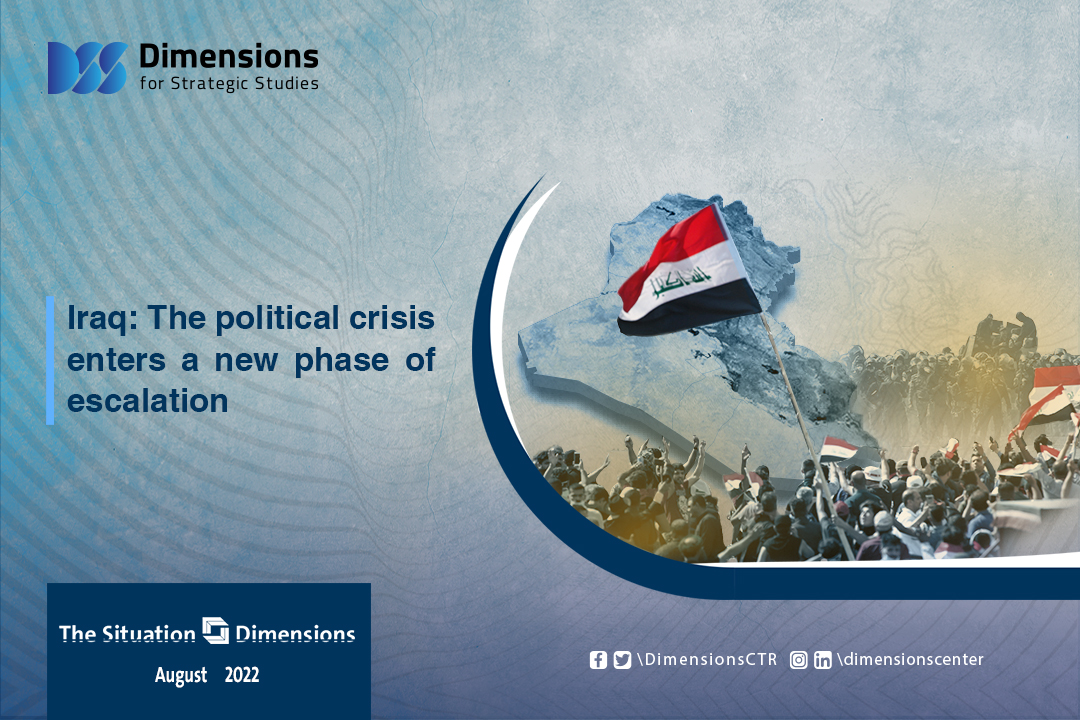
Iraq: The political crisis enters a new phase of escalation
2022-08-022144 view
Since the end of July, the Sadrist movement in Iraq began a large-scale popular escalation, which was directed mainly towards the parliament, in which the movement obtained the highest number of seats. This came before the movement's representatives submitted their resignations en masse last June.
The escalation by the Sadrist movement came days after the Coordination Framework Alliance (CFA), an alliance of Iran-backed of Shiite political and military factions, nominated Muhammad Shaye al-Sudani for the position of Prime Minister, which was taken by all parties as a message that the CFA was no longer willing to reach a settlement with the Sadrist movement. Moreover, such a move by the CFA was received by the other parties as a declaration by the CFAT that it is continuing to impose its candidate, taking advantage of the new composition of Parliament after the withdrawal of the Sadrist MPs.
The public demonstrations by Moqtada Al-Sadr's supporters aimed directly at disrupting the process of appointing a new prime minister, which is governed by the process of choosing a president of the republic. In a dynamic as such, both of the president and the PM will be CFA's allies, which Al-Sadr will not allow to happen; because it will mark the official beginning of the phase of drawdowning the influence of his movement within the state.
Furthermore, Al-Sadr aims to demonstrate his political strength and show his ability to mobilize supporters, as a reminder to CFA and the rest of the Iraqi parties that it is not possible for any option to proceed with if skips the Sadrist movement's wishes and interests.
It is noted that the policy of disassociation is pursued by the Sunni and Kurdish forces as much as possible in an attempt not to announce their positions about the al-Sadr-led popular protests; especially the aforementioned forces consider what is happening is just a conflict between the Shiite factions, which it should be resolved internally without any interference from others.
While not declaring their positions, the other parties do not want to say that they are not concerned with this matter at all. What confirms this suggestion is that the Kurdistan Democratic Party is one of the most prominent beneficiaries of Sadr’s moves that obstruct the path of renewal for Barham Salih as President of the Republic, whom the party tried with all its capabilities to obstruct his candidacy, but to no avail.
Moreover, Mustafa Al-Kazemi, the Prime Minister, directly takes advantage of Al-Sadr-led protest; because disrupting the appointment of Al-Sudani as prime minister means that Al-Kazemi will keep position for an additional period. Not only this, but also Al-Kazemi might be again as a compromise prime minister accepted by various parties.
Iran and its allies in Iraq are the big losers in the short term from Sadr's moves. Such moves promote al-Sadr's popularity, especially before the mobs who are angry at the political forces and also angry at the Parliament, which has achieved nothing since election ended. In addition to that, these moves impede the path of appointing the candidate that Iran supports in the post of prime minister, which will be followed by reappointing Barham Salih, Tehran's ally in Baghdad.
However, Iran's losses or profits in the medium and long terms depend on the course of events, and whether it is able to let its options pass.
In light of the current facts, it seems that matters could go through one of three directions:
The first: A political escalation, perhaps on the ground, by the CFA, as it may insist on holding the parliament session in another place to appoint Saleh and Al-Sudani. This means that the conflict between the Shiite factions has reached the moment of direct confrontation, which may develop into physical clashes between supporters of the two parties in streets. It might be further, like armed clashes between military and forces. This scenario does not serve the interests of all Shiite parties in the short to medium term.
Second: A return to de-escalating the situation on the ground and the continuation of the previous situation for a period that may extend to a year, after which the parliamentary elections will be re-held, the results of which will determine the nature of future scenarios.
Third: Reaching a compromise formula based on an initiative that is often put forward by an external party. This scenario seems optimal, but there are no signs of the existence of neither such an initiative, nor regional and local parties willing to accept this.





